|
|
||||||||
|
|
|
|
|
|||||
|
||||||||
|
|
||||||||
|
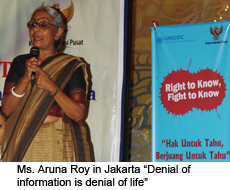
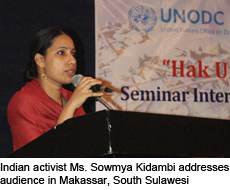
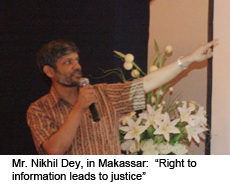 |
||||||||
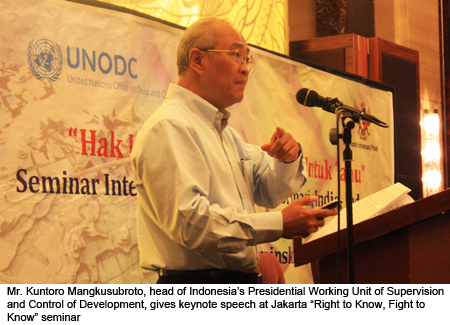
Jakarta (Indonesia), 29 March 2012 - Indonesia's landmark
2008 Public Information Act gave the public a right to request information and access government documents. However, there are concerns that the power of the law is not being exercised to its fullest extent and that citizens' lack of access to information contributes to corruption in public agencies. To support the Indonesian public's right to information, UNODC invited three Indian activists to Indonesia to share their insights on how to advocate for the public's right to information.
"The denial of information is the denial of life," said Indian activist Mrs. Aruna Roy during her presentation in Makassar, Indonesia. "Democracy is the only system that equalizes. The right to information is to make sure that what was intended for the people should be delivered."
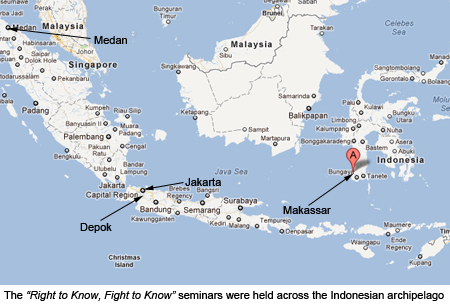
Jointly organized by UNODC and Indonesia's Central Information Commission (CIC), and funded by Norway, the India-Indonesia right-to-information seminar
"Right to Know, Fight to Know" toured the country. Sessions were held in Jakarta and Depok in Java, Medan in North Sumatra, and Makassar in South Sulawesi. A key feature of each seminar was the sharing of anti-corruption and right-to-information experiences by citizens of Asia's two largest democracies.
"Transparency is the main pillar of anti-corruption," said Mr. Kuntoro Mangkusubroto, head of Indonesia's Presidential Working Unit of Supervision and Control of Development. "Public service agencies should not be reluctant to disclose public information. It is our right to know where our money went."
India's right-to-information movement began in 1966 in small villages. It was led by Mrs. Aruna Roy and activists affiliated with the Mazdoor Kisan Shakti Sangathan (MKSS). In 2005, the Indian Parliament Years enacted the Right to Information Act. The law empowers Indian citizens to seek information from a Public Authority, making government more accountable and responsible to citizens.
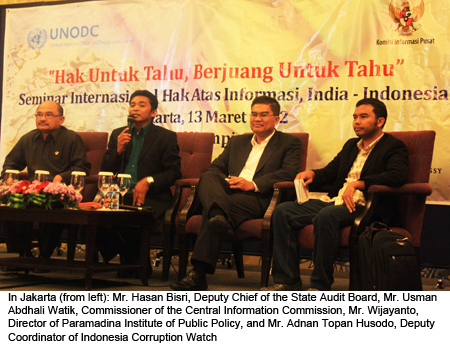
All three Indian experts stressed the importance of public activism, advocacy and commitment.
"It is important to understand how to raise awareness within the community, how to get the message to the media and how to get endorsement from the good elites. This kind of effort must be carried out jointly," conveyed Ms. Sowmya Kidambi, Director of Society for Social Audit, Accountability and Transparency, Government of Andhra Pradesh, India.
Across Indonesia and the world, lack of public access to government documents and data stiffles public debate on the issues, particularly those that affect the environment. Lack of information marginalises citizens and civil society groups, leaving them incapable of fully participating in vital public activities such as budgeting and monitoring governance. Right to information can transform lives, the activists noted.
"Right to Information helps people run the country better," said fellow activist Mr. Nikhil Dey. "In India, right to information makes state administrators and civil servants fear doing wrong and is helping build an open society that leads to better justice."
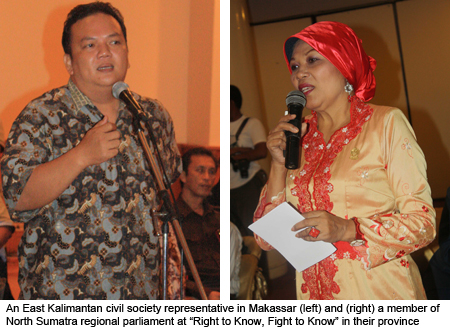
Over 580 Indonesian participants attended in total, including local government officials, regional parliament members, civil society representatives, students, academia and media.
Background:
Indonesia has continued to be the primary focus for specific anti-corruption initiatives for UNODC in East Asia and the Pacific. The Norway-funded project "Strengthening the Capacity of Anti-Corruption Institutions in Indonesia" supports civil society activities to fight corruption and NGO networking to counter corruption.